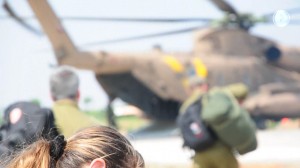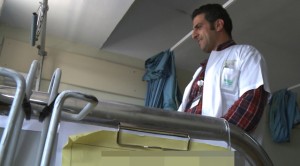
By Marney Blom
As the Syrian Civil War rages, Israel stands on the sideline witnessing the inevitable toll on human life. Although Israel and Syria are also officially at war, a steady stream of injured Syrians desperate for medical attention regularly arrives at Israel’s doorstep. They come through an area known as no-man’s land – the UN-guarded buffer between Israel and Syria riddled with land mines and crawling with Syrian snipers. The IDF have a firm policy when dealing with injured enemy civilians and soldiers – do all you can to help them.
In February 2013, the IDF constructed a field hospital along the Israel-Syria border for the sole purpose of treating wounded Syrians. However, when the needs of the wounded surpass the capabilities of the IDF field hospital – a military medical facility built specifically to treat wounded Syrians and situation in an undisclosed location along the Israel-Syria border – the IDF transport the injured Syrians to other Israeli medical facilities such as Ziv Hospital in Safed. The hospital staff of this northern Israel medical centre are personally familiar with the trauma of regional conflict. Ziv Hospital itself sustained direct rocket attack during the Second Lebanon War.
“For them Israel is the enemy,” said Joseph Farris a Maronite Christian Israeli Social Worker at Ziv Medical Centre. “In the first it was really a problem because I saw people crying [saying] that they [were] afraid of the Israeli army. But now, it is different. Now [Syrians are] coming and saying that they are happy that they [were taken] to the Israeli hospitals.”
Acts News Network was given permission to speak with some of the Syrians being treated at Ziv Hospital – as long as we agreed not to reveal their identities. As we visited their rooms – guarded by an IDF soldier posted outside – we observed how the Israelis take special pride in treating the Syrians well.
“What we can see here is a Syrian patient coming from a bomb injury,” said Dr. Alejandro Roisentul, Head of Ziv Medical Center’s Oral and Maxillofacial Surgery Unit, as he pointed to an X-ray with shrapnel lodged in the head region. From amputations to dental work the Israeli medical team use the most advanced technology on hand.
“He has been shot in his two legs,” said Farris at the bedside of a Syrian who had agreed to show us his leg wounds. “It [was] so hard because the airplanes bomb his village every day. He [saw] many things but he doesn’t want to talk about it. [It was] so bad.”
“People suffering from war trauma and from terror – [are] people,” remarked Dr. Professor Alexander Lerner, Chief of Ziv Medical Center’s Orthopaedics Department. “People suffering from bleeding from pain – terrible pain, especially children, I can help.”
“You start working and your arms are working before you are thinking. It is automatic,” said Lerner with a chuckle. “And in most – even in terrible trauma, in limbs at risk, most patients return shome with their limbs without amputations.”

Although successful this type of care is not cheap. Treating a total of 321 Syrians cost Ziv Hospital a whopping 4.8 million US dollars, and Syrians are not asked to pay a cent. Instead the funding comes from the IDF, the Israeli Ministry of Health and private Israeli donations.
No one is more amazed at the benevolence of their “enemies” than the Syrians themselves. And although every Syrian patient speaks of a longing to return home, the care and kindness demonstrated by the Israelis have effectively reversed their inbred bias against their Zionist neighbour – for good.
When asked if his attitude had changed since receiving treated from the Israeli Hosptial , one of the young Syrian soldiers whom we visited responded, “For sure! [The region] is in a [state of] war. We don’t like any of our neighbours. [But] after I came here everything has changed – it is different.”
So, for the moment, there is peace between citizens of two nations officially at war. All because Israel has reached out and loved her enemy.
“For me it is to give a smile [on the face of] a person,” said Farris, clearly moved by his work with the Syrians. “It doesn’t matter where he is from [or] which kind of religion – I did my job I think in this world.”
Marney Blom is news director for the Acts News Network.
Copyright 2014 © Acts News Network, Inc.
